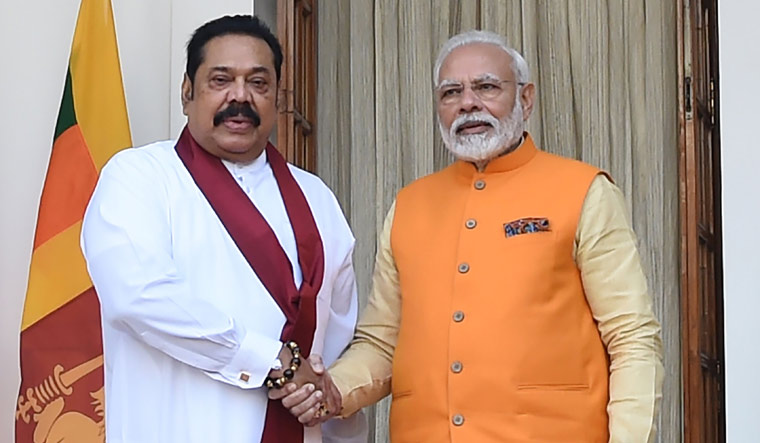Sri Lanka's strongman Mahinda Rajapaksa staged a political comeback on Friday after his party registered a landslide victory in the general elections. The results declared showed that the Sri Lanka People's Party (SLPP) alone had won 145 seats; with its allies, they have have 150 seats and a two-thirds majority in the 225-member parliament.
The party led by the prime minister won all but 4 of the 22 electoral districts on offer. The victory margins in the south, dominated by the majority Sinhala community, were in the high 60 per cent mark in most areas. The party polled 6.8 million votes at 59.9 per cent.
The biggest casualty from the result was the United National Party (UNP) of former prime minister Ranil Wickremesinghe. The UNP managed to win only one seat. Its leader and a four-time prime minister was unseated for the first time since he entered parliament in 1977. Wickremesinghe failed to win from Colombo district as his party finished fourth in most constituencies. The UNP only polled 2,49,435 votes or just 2 per cent of the vote and was relegated to the fifth position nationally.
Prime Minister Narendra Modi congratulated Rajapaksa, saying the two sides will work together to further advance all areas of bilateral cooperation. "Thank you PM @narendramodi for your congratulatory phone call. With the strong support of the people of #SriLanka, I look forward to working with you closely to further enhance the long-standing cooperation between our two countries. Sri Lanka & India are friends & relations," Rajapaksa tweeted.
Tracing Mahinda Rajapaksa?
Rajapaksa was born at Weeraketiya in Hambantota on November 18, 1945, as the third of nine siblings—six brothers and three sisters. He studied at Richmond College in Galle, and Nalanda College and Thurstan College in Colombo. After graduating from Colombo Law College, he began practising law. In 1970, when he was just 24, Rajapaksa was elected to parliament from Beliatta, which was once represented by his father, Don Alwin Rajapaksa. In 1977, when he lost a parliamentary election, he shifted his legal practice to Tangalle, which helped him build a support base. He was reelected to parliament from Hambantota district in 1989, and has never lost an election since.
Rajapaksa served under President Chandrika Kumaratunga, who appointed him as prime minister after the general election of April 2004, when the United People's Freedom Alliance won a majority.
He is best known for his brutal crackdown on the Liberation Tigers of Tamil Eelam (LTTE), and its struggle for autonomy in northern Sri Lanka. Mahinda had ended an almost 30-year-old war, becaming a hero for the country's Sinhala majority. There were, however, claims of war crimes, including extra-judicial killings, levelled against him. The country's Tamil and Muslim minorities still look upon him with a suspicious eye. He had told THE WEEK: "That is a label pasted on us by our political rivals. Of all those who have led this country since independence, my family is the most multicultural. There are people of all major religions and ethnicities in my family circle. One of the reasons why this majoritarian label has stuck is because we defeated the LTTE (Liberation Tigers of Tamil Eelam) militarily. But in that, we had no choice. We cannot allow terrorism in this country."
He was president from from 2005 to 2015, changing the Constitution and allowing his family and brothers Gotabaya, Basil and Chamal influential positions, leading to nepotism accusations. His domestic popularity appeared to wane during 2014 because of rising prices and concerns of corruption and abuse of power, and, in an attempt to secure another presidential term before losing support, he again called for an early presidential poll. But his political gamble backfired and he was defeated in the elections in 2015. Maithripala Sirisena, formerly a member of Rajapaksa's cabinet, defeated him and was sworn in as president. In 2015, many wrote the political obituary of Mahinda when he was extinguished in the presidential elections. Fast forward five years. The 74-year-old leader is back at the helm in Sri Lankan politics.
Mahinda had blamed the Indian Research and Analysis Wing for his loss in 2015. He also alleged that India brought Sirisena and Wickremesinghe together to keep him out of power. Although India subsequently mended relations with the Rajapaksas, the clan’s close ties with China are still a matter of concern. When he was president, Mahinda had opened up Sri Lanka for the Chinese who invested heavily in the country, including in the Hambantota Port, and many blame him for the country's fall into the Chinese debt-trap. Sri Lanka subsequently became an enthusiastic participant in the Belt and Road Initiative. Mahinda even allowed a Chinese submarine and a warship to dock at the Colombo port despite India’s objections.
The Easter bombings on April 21, 2019 that killed more than 250 people was a turning point in Sri Lankan politics as the then government appeared to have failed to act though it had advance intelligence report of an impending terror attack. The SLPP, led by the Rajalaksas, lambasted the government of President Sirisena and Prime Minister Wickremesinghe for the failure on the security front. The brother-duo promised security to Sri Lankans who became worried about Islamic extremism in the Buddhist-majority country. Gotabaya won the presidential election in 2019.
-Inputs from agencies










